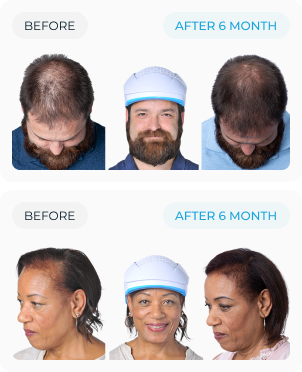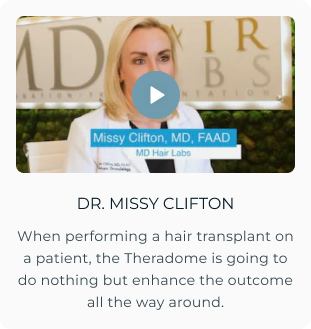When it comes to shampoo, most of us assume more lather, more results. But the truth is: not all shampoo ingredients are the same — and some can lead to scalp irritation, inflammation, and in some cases, contribute to hair loss over time.
This article isn’t here to scare you. It’s here to give you facts backed by science, not myths. We’ll break down the ingredients you should watch out for, explain what the evidence says, and show you what truly matters when choosing the right shampoo for healthy hair and scalp.
Can Shampoo Really Cause Hair Loss?
Here’s what the science says:
Shampoos are primarily designed to clean the surface of the scalp and hair, not to penetrate deeply or stimulate follicles. In fact, very few shampoo ingredients absorb into the skin at all — so most products that claim to "stimulate regrowth" are misleading.
However, that doesn’t mean shampoos are harmless. Ingredients that cause scalp dryness, inflammation, or allergic reactions can create the kind of hostile environment where hair follicles become stressed, dormant, or inflamed. And that can trigger or worsen hair loss — especially in those already genetically predisposed.
Learn More: Hair Breakage vs New Hair Growth
What Ingredients to Avoid in Shampoo to Prevent Hair Loss?
You should be cautious about shampoo ingredients and their possible effects on hair health. While shampoos are generally designed to clean and care for hair, some ingredients may contribute to hair loss in certain individuals.
Here are a few of the worst ingredients/chemicals in shampoos to avoid:
1. Sodium Lauryl Sulfate (SLS) and Harsh Surfactants
SLS is a cleansing agent that helps shampoo lather and effectively detoxify the hair — but it’s also linked to skin dryness, itching, and irritation. For people with sensitive scalps, it may strip away protective oils and trigger inflammation.
SLS doesn’t directly cause hair loss, but ongoing irritation can lead to scalp imbalance and worsen conditions like dandruff — both of which contribute to hair shedding.
What to do: Look for shampoos labeled “SLS-free” or “sulfate-free” and opt for gentle surfactants like coco-glucoside or decyl glucoside.
Also Read: Do Sulfate Free Shampoo Cause Hair Loss?
2. Parabens
Parabens (like methylparaben and propylparaben) are preservatives, but they’ve been shown to mimic estrogen in the body, which may affect hormonal balance. Disrupting hormones can, in theory, impact the hair cycle.
While parabens haven’t been definitively proven to cause hair loss, they’re under scrutiny for potential endocrine disruption.
What to do: Choose shampoos labeled "paraben-free" to be safe, especially if you’re experiencing hormonal hair loss.
Learn More: Why Parabens Are Bad for Hair?
3. Propylene Glycol
Used as a humectant and solvent, propylene glycol is found in over 90% of shampoos. While it helps retain moisture, it’s also known to trigger allergic reactions and contact dermatitis in some people.
What to do: If your scalp is inflamed, flaky, or itchy after use, check for this ingredient and consider switching to a simpler, hypoallergenic formula.
4. Formaldehyde-Releasing Preservatives
Ingredients like Dimethyl-dimethyl (DMDM) hydantoin or imidazolidinyl urea slowly release formaldehyde — a known irritant and potential carcinogen. While levels are low in shampoos, prolonged exposure can inflame the scalp and damage the hair’s protective barrier.
Avoid products with these ingredients if you already have scalp sensitivity or inflammatory scalp conditions.
5. Alcohol (Ethanol, Isopropyl Alcohol)
Not all alcohols are bad — but short-chain “drying alcohols” like ethanol and isopropyl alcohol can dehydrate your hair and scalp. This weakens the shaft and leaves hair prone to breakage.
Look for fatty alcohols like cetyl or stearyl alcohol, which are moisturizing.
6. Synthetic Fragrances & Dyes
Many shampoos include fragrance blends that are undisclosed and unregulated, making them a common source of allergic reactions. Likewise, artificial dyes can cause dermatitis or inflammation in sensitive scalps.
Seek fragrance-free or essential-oil-scented shampoos with transparent labeling.
7. Silicone Overload
Silicones aren’t inherently harmful — but when overused, they coat the hair, trap residue, and require harsh surfactants to remove. Over time, this buildup can clog follicles and interfere with scalp health.
Use clarifying shampoos occasionally and avoid long-term reliance on silicone-heavy products.
Learn More: Does Creatine Cause Hair Loss?
How Do You Know If Shampoo Ingredients Are Causing Hair Loss?

If you're experiencing hair loss and suspect it might be due to bad shampoo ingredients, there are some signs to look out for. One common indicator is excessive hair shedding (more than 50-100 strands per day) during or after shampooing. It could be a red flag if you notice a significant increase in the amount of hair you lose while showering.
Additionally, if your scalp becomes dry, itchy, or irritated after using a particular shampoo, it might be a sign that the ingredients are harsh and causing damage. Pay attention to any changes in the texture of your hair as well. If it becomes brittle, weak, or prone to breakage, it could result from using shampoos with harmful chemicals. These signs can help you determine if your hair loss is a result of bad shampoo ingredients.
Ingredients That Help Fight Hair Loss (and Inflammation)
Shampoos won't grow hair — but they can help support scalp health and enhance treatments like Laser Phototherapy (LPT) when formulated correctly.
Clinically Supported Actives:
- Piroctone Olamine – Reduces shedding, improves hair shaft diameter, and fights dandruff. Preferred over ketoconazole in recent trials.
- Ketoconazole (1-2%) – Antifungal and anti-inflammatory; reduces shedding and increases hair density.
- Zinc Pyrithione – Controls dandruff and supports a healthier scalp environment.
People using 1% piroctone olamine saw a 16.5% reduction in hair loss and a 7.7% increase in shaft diameter.
Important Tip for LPT Users
Using the wrong shampoo with an LPT device (especially one with SLS or fragrances) may reduce the device’s effectiveness by triggering scalp inflammation. Use medicated, anti-inflammatory shampoos with no SLS, parabens, dyes, or phthalates.
What to Look for in a Shampoo?
When choosing a shampoo that won't cause hair loss, knowing which ingredients to watch out for is essential.
Look for shampoos free from:
- SLS and harsh sulfates
- Parabens
- Dyes and synthetic fragrances
- Formaldehyde releasers
- Propylene glycol
Learn More: 5 Ingredients to Avoid in Hair Products
Look for shampoos that ideally contains:
- Piroctone olamine, ketoconazole, or zinc pyrithione
- Moisturizing agents like aloe, chamomile, or coconut derivatives
- Mild surfactants (e.g., coco-glucoside)
Also Read: Does Dry Shampoo Cause Hair Loss?
Conclusion
Shampoos are like windshield washers — they clean the surface. But if your hair is struggling, you’ll need something more powerful — like LPT therapy or medical treatments — to drive results.
Pairing the right shampoo with an LPT helmet like Theradome not only protects your scalp but maximizes your chances of reversing hair loss safely and effectively.
Furthermore, if you are suffering from the pain of losing your hair, you will benefit from this ground-breaking, comprehensive book “Grow It Back.” You'll finally understand how you can stop it and regrow your own natural hair using FDA-cleared, safe laser phototherapy.

























